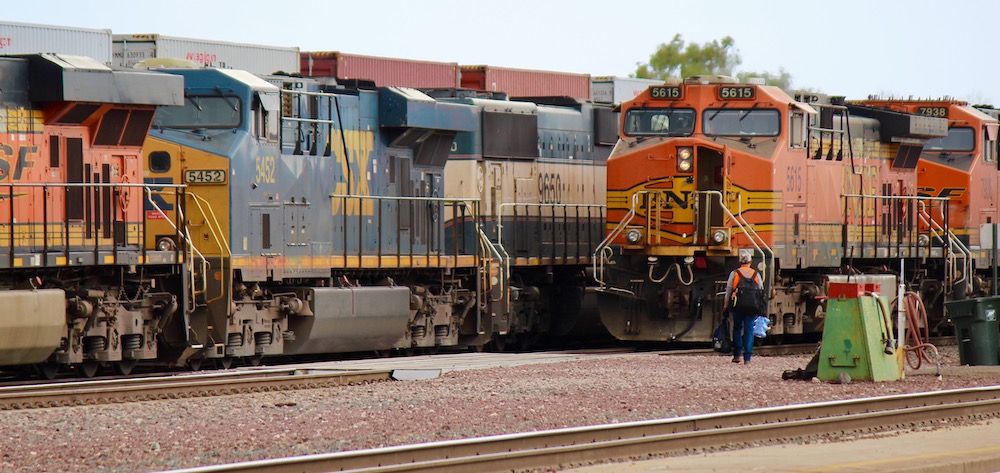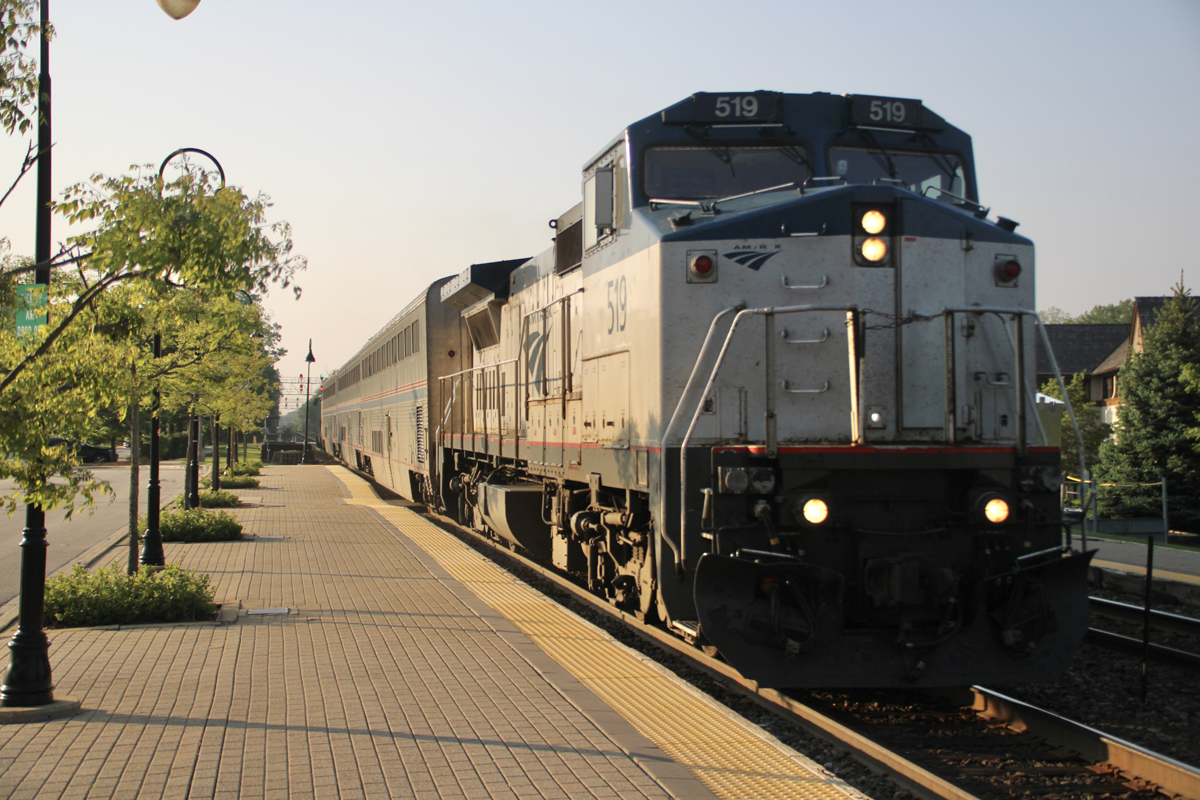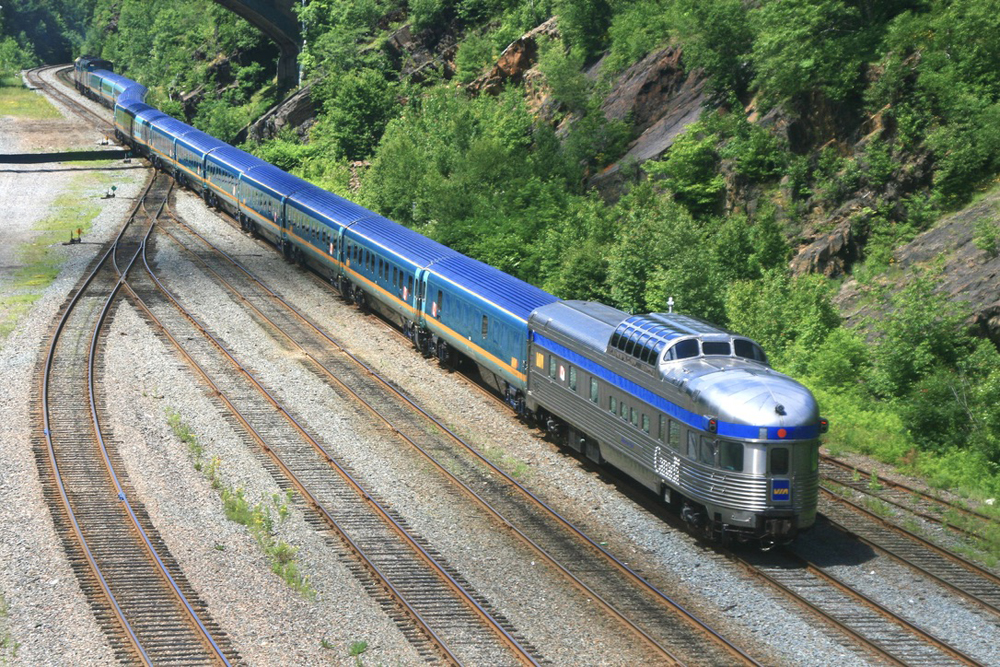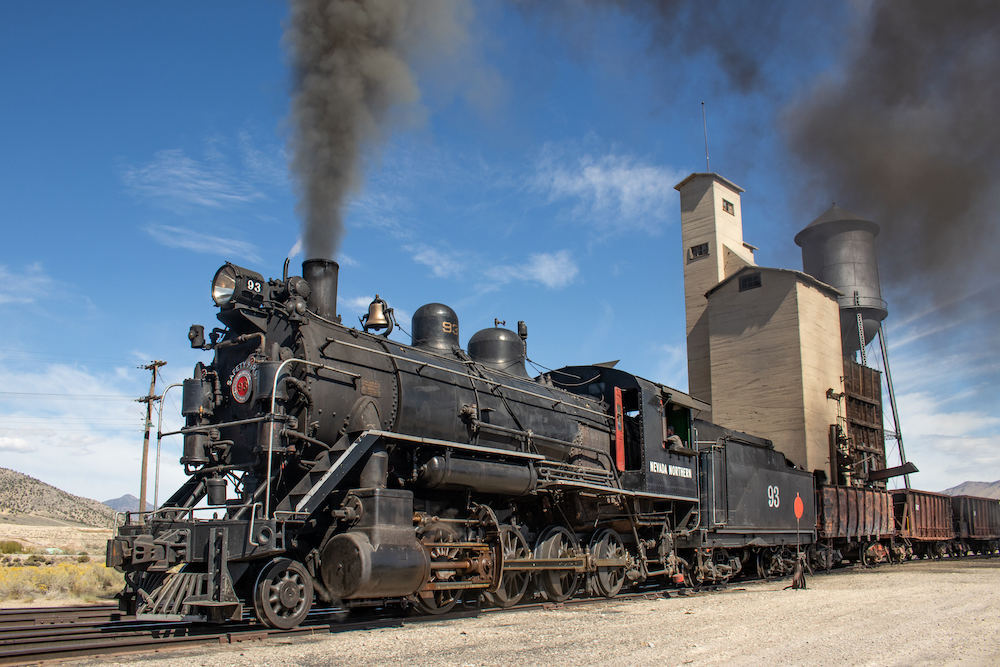
If there’s one thing all railroaders have in common, it’s the ability to complain about anything and everything. They’re world-class grumblers. So when train crews and labor unions bash the railroads for this, that, and the other thing, sometimes you have to wonder if they’re crying wolf.
Wonder no more. The union-management pot, which is normally set on simmer, is boiling over at the big four U.S. Class I railroads. And it’s prompting railroaders — even those with 10, 15, or 20 years of experience — to pull the pin before they’ve reached retirement age.
In other words, they’re voting with their feet. This tells you that railroaders aren’t just bitching about their demanding jobs. They’ve had it. As ol’ Johnny Paycheck would sing, “Take this job and shove it.”
None of this should come as a surprise. CSX Transportation, Norfolk Southern, and Union Pacific have for the past couple of years earned the dubious distinction of being among the worst places to work, according to the job-rating site Glassdoor.
UP and NS ranked No. 1 and No. 2, respectively, due to their low ratings from their employees, while CSX held the No. 5 spot. Go back to 2008, though, and you’ll not find a railroad among the 50 worst companies on Glassdoor’s list.
What’s changed? It’s not one thing, railroaders say. It’s everything.
A massive wave of layoffs began when E. Hunter Harrison brought his Precision Scheduled Railroading operating model to CSX in March 2017. Since then, rail employment levels have fallen nearly 30% as NS and UP adopted PSR and BNSF Railway began running a leaner operation, too. In many cases this puts more work on the shoulders of the railroaders who kept their jobs — and has meant fewer days off under attendance policies that crews view as draconian.
Then there are PSR-related operational changes, such as running fewer but longer trains. They take longer to build and are likely to encounter more mechanical mischief en route. Conductors don’t want to walk 2 miles or more to find and fix a defect at the back of the train.
A side effect of longer trains is running with lower horsepower/ton ratios. The combination of heavier trains and no horses to spare makes for longer trips for conductors and engineers. They also say that TripOptimizer and LEADER, the energy management systems that act like advanced cruise control and help conserve fuel, also slow transit times. Ditto for throttle and speed restrictions some railroads use to save fuel.
And then there are the national contract negotiations that have been stalled since 2019. Railroaders have worked through the pandemic as front-line workers and have now gone nearly three years without a raise. Talk of one-person crews, with conductors shifted to the ground, doesn’t help and has been a stumbling block in negotiations.
Add all this up, and it’s not hard to see why railroaders are a disgruntled lot.
Listen to what one railroader recently posted on Trainorders: “After 25 years my quality of life AND pay are worse, and so is my home life and health. I feel like I really did make a deal with the Devil when I hired on. Railroad life has never been great, but at least back in the old days you made decent money, could layoff pretty much when you needed, and had regular jobs to look forward to when your seniority allowed. Now it’s all gone … And the carriers have the balls to say we’re just overpaid complainers. A pox on them.”

Longtime union leaders say they can’t recall labor-management relations or morale being this bad at the big four systems. As experienced railroaders leave at higher rates than normal, it exacerbates the railroads’ ongoing crew shortages as new hires are hard to find and even harder to keep, which of course snowballs into operational and service problems that then demand even more crews.
Credit CSX CEO Jim Foote for saying several times this year that railroads need to mend fences with their unionized employees and negotiate new contracts. “That is the biggest transformative change that CSX can make, and that is the biggest transformative change that the industry can make: Finally, finally, finally building a better rapport with our employees and having a better working relationship with them,” Foote told the North American Rail Shippers conference.
His counterpart at NS, Alan Shaw, also seems intent on improving relations with labor and has been listening to railroaders out on the ballast.
But things could get worse before they get better. One crewman tells me that if the new contract doesn’t include a hefty raise that would make the job worthwhile, he expects anywhere from a quarter to a third of the people in his terminal to walk away.
You can reach Bill Stephens at bybillstephens@gmail.com and follow him on LinkedIn and Twitter @bybillstephens














What are things like at CN and CP. Hunter Harrison was at both roads.
Current business model is mostly “slow liquidation”. Just squeezing dollars out of declining car load and dead coal franchise.
Handing procedes to owners. No real investment in improvements.
When I started with the RR I was told it is a railroaders’ God-given right to bitch and complain. I noticed it took anywhere from 6-18 months to understand what that really means. There is more than one situation where that rule applies; it always applies to management. I worked for Amtrak, so yes the trains are scheduled but do to outside influences my crew and I died more times than you would think. Hunter Harrison was a nut bag, psr needs to be scrapped yesterday. Bill, your comments were poorly worded and back-pedaling won’t help. The new crop of upper management/ CEO look nice I bet not one of them could actually run or read a signal aspect or have any idea what is in the rule book. They did but it was years ago. To my brothers and sisters who actually run the trains and do the work, hang in there if you can. Railroad retirement is a nice thing. And my vote is with you, go on strike. Prez Zucchini and Trans. Sec’y Butthead are idiots and they won’t back you up.
Not a railroader, just an observer…
As freight service and the overall supply chain degrades, calls for government involvement will increase. That cannot be good. I feel like I’m reading Atlas Shrugged.
I’ve been a railfan since I was 4. I’m now 67 and retired from 41 years in TV broadcast engineering. Even in my industry, it’s the almighty dollar and how much more work you can wrangle out of an employee. I also watch VirtualRailfan.Com and the number of trains have dropped but the length of trains have almost doubled in size. I have no idea how one engineer, say, on the UP, can run 2 coal trains coupled together that is almost 2.5 miles long and if I figure things out right, you’re talking about 40,000 tons of total consist and loads weight. I happened to see a coal train in Kearney, NE lose its air and it took a 1/2 mile for the train to stop, based on the 48 cars rolling by from air loss to a complete stop. And now you have a conductor who may have to walk that long train to find out what is wrong. And doing that in the winter time says it all. I truly feel for all railroad workers. Not having a contract nor a decent paycheck doesn’t help. Add to that investors and shareholders complaining about not getting the return they expect. As a railroader in Nebraska told me, the 4 Class Ones are being run into the ground. And PSR ain’t helping either. I hope that things will turn around. We need the railroads to move America’s merchandise. Good luck to all.
Can someone call Progress Rail on the phone and tell them they want an electric cart that can fold down from the back of their engine so they can survey a 2 mile long consist without walking?
Simply bleed off power from your engine to keep it charged along the way and if you have to do an impromptu inspection, climb down off the cab, walk to the back, insert and turn your key and a cart comes down.
a) Respect: If management is going to attract and retain the sort of people that can run two mile trains, they as whole need to show respect with their actions. Get creative. Maybe that means pushing telemedicine, guaranteed days off, free dry cleaning, etc. Okay, okay, probably not the crowd for that one but be creative and find ways of making their lives easier. Maybe a couple free oil changes each year where while they’re at work someone takes care of it for them.
b) Misnomer: Two-man crew is a misnomer. There are hundreds, maybe arguably thousands, of people constantly working just to keep a single train moving.
c) Paradox : T + E says the job doesn’t pay well enough + hours suck + can’t get time off + benies aren’t good to the point a lot of people don’t want the job; they’re going to quit. Then when propositioned with something that would help alleviate those, to allow for more scheduling flexibility + higher compensation, having some conductors work more than one train, well, T + E suddenly decries hell no, this job is too good to risk y’ll taking it away. Which is it? Piss or get off the pot.
I’ve got 28 years on the railroad, the only thing I can say is, get rid of PSR, start running normal size trains, get rid of the current CEOs who worship wall st. and treat the customers and crews like they are important.
These desk Jackie’s just sit behind computers and crunch numbers.
It’s always profits over people.
In my 25 years, it’s gotten worse. Yes.
With bnsf new hi-viz policy, there is no way to get time off for doctors, dentists and health related issues without losing points and ending up in an investigation, all for trying to take care of your health.
And best your family gets sick. The railroad will penalize us for this as well.
BNSF really stands for better not start a family.
Cause they will be non existent to you.
Some of us old heads went from extra boards to regular jobs on days and now it’s back to on call and nights for some again. Due to company cutting good jobs with good days off.
Don’t blame those with less seniority for leaving. Others like us are grinding it out to the end if we can.
This stance that is being made is a good one. And for those that don’t know the field don’t know about our situation with unscheduled lineups and living by the phone 24/7.
Rotting in trains waiting for transport to the lodging facilities when their are no contract drivers available to pick us up without running out of hours.
Yes this is the job we chose. Was good pay at the start and you could try to manage your home life. Not so much now.
The compensation pay was always for the sacrifice of home life. Now it’s sacrifice more and not paid for it.
Now there needs to be a balance better .
It’s hunter’s plan of do more with less.
Come out and be on call for a pay period and then think about doing it for 30 years. Could you do it? Foote?? Boychuk??
Amid all the Sturm und Drang, it would be of value to see some numbers, rather than opinions. This article is all opinions.
How many ‘old heads’ have resigned?
How many rookies are still working?
How many laid-off have decided not to return?
People don’t quit good jobs…
Roger, people actually do quit good jobs. Working at a good job with/for bad people creates a poor working environment. A person can only tolerate so much before they throw in the towel.
Who is telling management that the T&E will gve in ? I am afraid that operations have gone over a tipping point. A wild cat walkout is comming soon.
Yep give it about 5 weeks.
They are reaping the whirlwind which they started and is now out of control.
Great article, Bill!
“If there’s one thing all railroaders have in common, it’s the ability to complain about anything and everything. They’re world-class grumblers. So when train crews and labor unions bash the railroads for this, that, and the other thing, sometimes you have to wonder if they’re crying wolf.”
Wow Bill, tell us how you really feel. Thanks for lumping all railroaders into one pot. Maybe you need to step away from the computer for a month, pack a bag and work with a crew.
Steven, everyone complains about their employer and/or job. But many railroaders have raised this to an art form. This was meant as a compliment, not a put down. And note the quote from a railroader in the 12th paragraph, who notes that management thinks crews are “overpaid complainers.” His words, not mine. The point here is that the railroads need to take the complaints seriously. Thank you for reading and taking the time to comment.
Sorry Bill, I read it over several times and it reads like an insult. It doesn’t matter what you intended; IMHO you could have phrased the sentence a little better to get the point across.
Bill, as usual, you are “right on” with your analysis. Yes, the layoffs account COVID were overdone, but the implementation of PSR on the US Class 1’s (even CSX when Hunter was around to do it) isn’t – as I understand it – how he had first designed it and implemented it at CN. Instead of trains, say on the old IC, leaving Centralia, IL, headed northbound to Marham, and meeting a southbound at Champaign-Urbana, headed to Centralia, with crews getting off, switching trains, and headed back to their home terminal, crews now are at away-terminals with no opportunity for doing anything else and wind up not even having the company pick up their meal expense. If Jim Foote says that the conductor job should be redesigned, well, maybe just gather together the guys and gals who do the job and ask them.
I had a meeting today with some operations and marketing folks from NS and I was encouraged to learn that they all feel very positive about new CEO Alan Shaw. It would be so great to learn that NS was making significant progress in on-time train performance AND crew morale but I don’t think we are there yet.
Thanks, Bill!
Nah. Same old, same old, I’m afraid.
Part of this issue come from RR Mgmt no longer comes from the ranks. They no longer have any hands on experience in train service, dispatching, etc. Most current RR Mgmt has never worked under the rule book to actually understand it. They’ve never had to do pickups or set outs in the middle of winter.
Why? Because they’ve also cut manager’s salaries so there’s no incentive to go into Mgmt while often taking a cut in pay & benefits.
Foot service always trumps lip service.. Just keep that in mind….
Exactly.
I don’t really care what they say. Let’s see what they do.
True NP story: I called crews at Northtown (Minneapolis) in 1969 and the NP would not hire switchmen because the NP knew the merger was close and they did not want merger protected switchmen.
I had to call a crew for the Northtown to Brainerd, MN turn and told the trainmaster of my lack of brakemen. He called someone and two hours later two x-brakemen from Labor Relations showed up to fill the slots.
Ed Burns
Happily retired NP BN BNSF from Northtown.
There would be nothing more valuable to the industry than the CEO’s get out and spend a week with T&E workers.
“Undercover Boss”
Unfortunately not going to happen.
The path forward is amazingly simple. My cat Burlington could figure it out. Here’s what will happen: T+E crews will leave in droves, a combination of normal attrition through retrment, combined with accelerated attrition through early quitting before retirement age. On the other side, new hires, it won’t happen because no one wants the job.
The upshot is, there will be no T+E crews. In order for a train the move, the CEO will have to run it himself (or herself).
Pardon my ignorance but what does “T and E” stand for? Thanks!